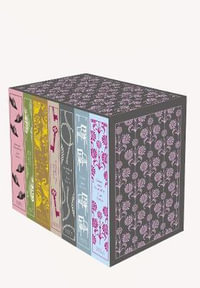
At a Glance
Paperback
$27.50
Aims to ship in 10 to 15 business days
When will this arrive by?
Enter delivery postcode to estimate
Review by John Purcell
This is the book Jane Austen wrote to rid herself of the fog which had settled upon her imagination after reading too many bad romances. Northanger Abbey pokes fun at the tropes which had developed in fiction in the years Jane Austen was growing up. Thankfully, many of these novels are no longer read, but a few survive. The better examples are still considered classics, the works of Fanny Burney and Ann Radcliffe, for example.
In short, she let the worst of them have it. For starters the heroine of Northanger Abbey, Catherine Morland, is no fainting heroine. In fact, Austen opens the novel with a list of the things which make her completely unsuited to be a heroine.
All of Jane Austen’s novel can be considered in parts romantic comedies, but none are as funny as Northanger Abbey, once you know what she's up to.
About the Author
Jane Austen's life was, on the surface, uneventful and serene, but her works reveal a mind of enormous vitality and scope, and a powerful understanding of human behavior. Bom on December 16,1775, in the Hampshire village of Steventon where her father was a rector, she grew up in a lively, affectionate family, who were (she recalled) "great novel- readers." In rural Hampshire, among the minor landed gentry and country clergy so perfectly portrayed in her work, she wrote and anonymously published SENSE AND SENSIBILITY (1811), PRIDE AND PREJUDICE (1813), MANSFIELD PARK (1814), and EMMA (1816). She never married, and she ignored literary circles, ridiculing the popular Gothic novel and rejecting the tenets of Romanticism. Northanger Abbey and Persuasion were published after her death on July 18,1817. Jane Austen described her own writing as a "little bit of ivory" and maintained that "three or four families in a country village is the very thing to work on." These self- deprecatory remarks understate the universality of her concerns and the largeness of her most prevalent theme: the need for men and women to find self- awareness and identity while accepting, out of necessity, the powerlessness and dependency which society so often confers upon them. Her flawless prose, displays such shrewd wit, delicate irony, and accomplished.
Industry Reviews
Somebody reading over my shoulder refuses to believe that I found Northanger Abbey funnier than Catch 22, but I did. So there -- Jenny Colgan
The most perfect artist among women, the writer whose books are immortal -- Virginia Woolf
Jane Austen's lightest and most playful novel * Independent *
Jane Austen shocks me. Beside her, Joyce seems innocent as grass -- W.H. Auden
ISBN: 9780099511878
ISBN-10: 0099511878
Series: Vintage Classics
Published: 1st October 2008
Format: Paperback
Language: English
Number of Pages: 256
Audience: General Adult
For Ages: 7 - 10 years old
For Grades: 2 - 5
Publisher: RANDOM HOUSE UK
Country of Publication: GB
Edition Number: 1
Dimensions (cm): 19.5 x 13.1 x 1.6
Weight (kg): 0.18
Shipping
| Standard Shipping | Express Shipping | |
|---|---|---|
| Metro postcodes: | $9.99 | $14.95 |
| Regional postcodes: | $9.99 | $14.95 |
| Rural postcodes: | $9.99 | $14.95 |
How to return your order
At Booktopia, we offer hassle-free returns in accordance with our returns policy. If you wish to return an item, please get in touch with Booktopia Customer Care.
Additional postage charges may be applicable.
Defective items
If there is a problem with any of the items received for your order then the Booktopia Customer Care team is ready to assist you.
For more info please visit our Help Centre.







































